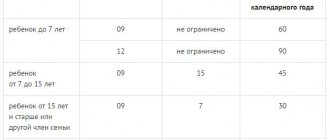Federal Law No. 229-FZ dated October 2, 2007 “On Enforcement Proceedings” states that deductions can be made from temporary disability benefits under a writ of execution. The same norm is spelled out in Government Decree No. 841 dated July 18, 1996.
That is, the law does not prohibit taking alimony or paying off other debts not only from wages, but also from such a type of income as temporary disability benefits, including the repayment of a writ of execution from sick leave for BiR (pregnancy and childbirth).
When is an employer required to make deductions?
So, we figured it out, the writ of execution, or more precisely the amount on it, is withheld from the sick leave. But the employer does not always have an obligation to use part of an employee’s income to pay off debt or pay alimony. His actions will be legal only when so-called executive documents are officially sent to him. According to law 229-FZ, these are:
- writ of execution from the court;
- court order;
- a notarized settlement agreement on the payment of alimony.
If there are none of these papers, the claimant cannot demand the withholding and transfer of any amounts. And if a person paying any regular or periodic payments to the debtor, having received copies of the settlement agreement or court order, evades the withholdings, he faces financial liability. Punishment may also follow for violating the retention order prescribed in the submitted papers. For example, if it is indicated in favor of the creditor to send a certain fixed amount, it is precisely this that should be transferred. If the amount to be recovered is stated as a percentage of income, this is what must be taken from all income, including temporary disability benefits.
Child support
According to the legislation of the Russian Federation, alimony must be paid from a citizen’s income in the amount of 25% for one child, 33% for two and 50% for three. The needs of children remain the same even during the illness of their parents, and therefore a citizen’s illness does not serve as a reason to exempt him from alimony: payments for temporary disability are also considered income from which they must be paid. Please note that income tax is withheld first, and only then alimony is calculated based on the remaining amount. In total, up to 70% of income can be withheld (if it is necessary to support children from different mothers).
Let us note an important point: although a child always needs funds, even if a parent who does not live with him is ill, his interests should also be taken into account. After all, an illness can require considerable expenses, and as a result there will simply be no money left for payments. Therefore, there is a condition for the payment of alimony to be made on sick leave as well: permission for this must be given in the executive document. In its absence, no payments will be made.
When an employer does not cooperate with bailiffs
Over the past 5 years, a project called “Direct Payments” has been carried out in the Russian Federation. Its participants are excluded from the process of calculating and paying temporary disability benefits. Employers only need to submit the documents necessary for the calculation, as well as pay compensation for the first three days of the employee’s illness. You can read about the rules for the project, its participants and expansion plans in Government Decree No. 294 dated April 21, 2011.
Articles on the topic (click to view)
- Is sick leave considered income?
- What to do if you have extended sick leave for pregnancy and childbirth
- What to do if your employer does not accept electronic sick leave
- What to do if you are not given sick leave
- How many days does it take for sick leave to arrive from the Social Insurance Fund?
- What to do if the place of work is not indicated on the sick leave
- Are sick leave taken into account when calculating maternity leave?
At the moment, 20 regions have already joined the Direct Payments project from the Social Insurance Fund. From July 1, 2021, 13 more constituent entities of the Russian Federation will join them (their list is on the FSS website). Employers registered in these territories may quite legitimately refuse to respond to documents presented by bailiffs or debt collectors. After all, they are not actually involved in paying benefits, so they cannot deduct anything from it. In this case, you must contact the regional branch of the Social Insurance Fund, where settlement with the debtor is made.
Note that the law allows an entrepreneur to act as a representative of the claimant. Therefore, he can send enforcement documents to the fund on behalf of alimony recipients.
Based on what documents deductions can be made
The employer should know from what employee income interest is calculated to pay off the resulting debt and in what amount. Since the employer is held administratively liable for illegal deductions, as well as for not making them.
This is important to know: Where to submit sick leave to your employer
Legally significant human actions give rise to certain rights and obligations.
Basically, obligations of a material nature arise when:
- concluding an agreement or transaction the subject of which is the property rights of a citizen (bank loan agreement, mortgage, property lease agreement, etc.);
- causing harm to human life or movable and immovable property.
Expert opinion
Polyakov Pyotr Borisovich
Lawyer with 6 years of experience. Specialization: civil law. More than 3 years of experience in drafting contracts.
But compensation can be recovered only if the victim seeks protection in court and wins the case. Or if a written agreement on compensation for harm is concluded between the parties.
Some duties arise regardless of a person’s actions: the duty to support disabled parents and spouses, the duty to provide for minor children, etc.
If a citizen refuses to voluntarily fulfill the material obligation assigned to him, then the recipient of payments or the lender has the right to contact government authorities so that the executor takes measures against the violator and contributes to the restoration of rights. Enforcers have the right to take measures against the violator only after receiving a written application from the claimant, as well as after receiving a writ of execution or agreement.
The claimant has the right to demand forced execution of a material obligation from the debtor only if one of the following documents is available:
- Judicial act: a positive court decision or court order. To do this, the collector needs to apply to the judicial authority with a statement of claim for debt collection. To win a case, you need to correctly draw up a statement and prove your reasons in court. After the case is considered, the court will issue a judicial act and issue an official document to the applicant. Civil cases regarding debt collection are considered within 2 months. If a person has indisputable evidence (a receipt certified by a notary, an agreement drawn up in accordance with the requirements of the law), then the case will be considered in simplified proceedings. When considering a case under a simplified procedure, the participation of the parties in the trial is not required. The court resolves the dispute on the basis of the documents provided by the parties. The judge issues an order 5 days after the application is submitted. However, upon a justified request of the second party, the court decision rendered in a simplified manner is canceled. In this case, the proceedings are resumed and the case is considered in accordance with the general procedure.
- A notarized agreement concluded by citizens independently or with the participation of a professional mediator, notary or lawyer. If the debtor and the collector are unable to resolve the dispute on their own, then it is better for them to turn to a notary or mediator. By concluding an agreement, the parties can independently determine the timing of the fulfillment of the obligation and the procedure for making payments (partial repayment of the debt or repayment of the debt in one payment). The agreement must be notarized. The execution of the agreement must comply with established requirements. If it was concluded in violation of the requirements specified in regulations, then the debtor may invalidate it in court.
- Writ of execution. You can obtain this document from the judicial authority. To do this, the claimant must apply to the court in which the dispute was resolved. To receive this sheet, you need to write an application and attach a copy of the decision or agreement to it. After the person applies and provides all the necessary papers, the chairman will issue a document with which the claimant can demand forced execution. The writ of execution is issued in 1 copy. If the original sheet is lost, the person who previously received it can again contact the chairman with an application for a duplicate. For re-issuance of a sheet, a state fee must be paid, the amount of which is determined by the Tax Code of the Russian Federation. A copy can only be obtained from the institution where the original was received.
The citizen who is entrusted with the obligation must begin to fulfill it after the date specified in the agreement or after the judicial act has acquired legal force.
If a party continues to evade repayment of a material debt, the other party has the right to contact the bailiffs with a writ of execution or a court order.
Bailiffs have a number of powers:
- They can make deductions from all of the debtor's income. Income includes: wages, remunerations, profits received from renting out residential premises, some types of benefits, monetary rewards for achievements in the scientific or creative field, etc.
- If a person obstructs the work of the bailiffs in any way and maliciously avoids fulfilling the obligation, the bailiffs have the right to impose restrictions on the person’s movement (the person will be prohibited from leaving the country), impose restrictions on driving a vehicle, put the defaulter on the wanted list, sell the real estate of the person who does not pay debt, contribute to bringing a person to administrative or criminal liability.
However, all of the above are extreme measures. If the debtor is officially employed and cooperates with the bailiffs, then the bailiffs simply withhold a certain percentage of the person’s profit every month.
To do this, a writ of execution with a resolution from an authorized person is sent to the organization in which the debtor is employed. This document is sent to the accounting department, and the employees of this department will make deductions from all the employee’s income until the debt is fully repaid or until the day when the debtor’s obligations cease (the children for whom alimony was paid reach the age of majority, the death of the alimony recipient, etc.).
Is alimony taken from sick leave in 2021?
The Family Code of the Russian Federation provides for the equal responsibility of parents (legal representatives) to provide financial support for children who are dependent on them. This norm is enshrined in Article 80 of the RF IC and is valid until children reach adulthood. Alimony (the monetary equivalent of maintenance) is paid to minor children in the event of separation of parents.
When leaving the family, the father is obliged, in accordance with the requirements of the law, to pay money for the upbringing of his children.
Funds for child support are withheld from all types of income, even in case of disability and during the period of temporary incapacity for work.
Alimony from sick leave is calculated by the accounting department only if there is a writ of execution issued on the basis of a court order.
Alimony: calculation procedure
Financial responsibilities for raising children are borne by the father and mother, subject to documentary confirmation of their status. Such documents are:
- a certificate confirming the fact of the child’s birth (issued by the civil registry office);
- a judicial act recognizing the paternity of a specific person (less often, motherhood).
If a man does not recognize paternity in the event of the birth of a child in a civil marriage and refuses to enter information about paternity in the child’s birth certificate, alimony can only be recovered from him by a court decision.
If a parent living separately (due to divorce) refuses to voluntarily pay maintenance for the child of whom he is the father, alimony is collected forcibly.
Depending on the number of children born in marriage, alimony is established in shares:
- a quarter of all types of income of a parent - for one child;
- a third of income is for two children;
- half of the total income is for three or more minor children.
Such proportions of payments for child support are established by Decree of the Government of the Russian Federation No. 841 of July 18, 1996. The regulatory document lists all types of earnings from which child support is calculated.
Types of income taken into account when calculating alimony
Alimony deductions are made from any regular income or amount of funds earned by the debtor at the end of the financial year. The offset includes all incentive payments and bonuses. Wages for work in hazardous conditions, all types of remuneration, dividends, income from bank deposits, etc. are also taken into account.
Alimony is calculated on the following types of income:
- Renting real estate.
- Profit from shares, investments and other financial business instruments.
- Income from participation in the activities of private enterprises with commercial activities.
- Income from performing work on the basis of civil contracts.
Thus, the list of income subject to offset for alimony payments is quite wide. These include regular and periodic cash receipts into the debtor’s income. Therefore, the alimony burden applies to all types of income, and not just to salary at the place of work.
Alimony payments from sick leave
Is alimony withheld or not from the temporary disability benefits of the debtor? This question interests many creditors and accounting specialists. It is legally determined that deductions from sick leave are possible in a number of cases.
Insurance accruals from the Social Insurance Fund in connection with the temporary disability of the insured person are included in the list of income from which child support is deducted by law.
According to Government Decree No. 841, sick leave is subject to alimony encumbrance solely by a court decision or on the basis of an agreement on the payment of alimony certified by a notary.
In other cases, withholding alimony from sick leave is not legal.
An exception to the general rules for establishing alimony encumbrances on sick leave is a documented fact of an industrial injury. Article 101 of Federal Law No. 229-FZ of October 2, 2007 establishes a ban on the deduction of alimony from a debtor who was injured in the performance of official duties.
Alimony payments in most cases are long-term in nature. Therefore, the economic situation affects the rise in prices and the level of consumption of the population. The possibility of indexation of alimony payments collected in a fixed amount from the debtor’s income (or by agreement) is provided for in Article 117 of the RF IC.
In 2021, adjustments to the amount of alimony due to inflation are made simultaneously with an increase in the minimum level of income necessary to maintain the health and social development of a child (the subsistence level).
The minimum level of consumption for the population is confirmed by a regulatory government act, taking into account regional characteristics. The increase in the amount of alimony payments subject to collection is calculated as part of enforcement proceedings. In accordance with the new law on indexation of alimony, signed by the President of the Russian Federation V.V.
Putin, bailiffs were given the opportunity to quickly collect alimony payments from debtors, taking into account the volume of indexation in the economy.
Indexed alimony is paid only if a court decision is made on payments in a fixed amount. When paying salary in shares, indexing of alimony payments is not provided for by law.
Thus, indexation of alimony payments is a government measure to protect these funds from depreciation.
Withholding alimony from sick leave in 2021
A special feature of the mechanism for deducting sums of money to pay alimony in case of temporary disability of the debtor in 2021 is associated with a new method of paying benefits for temporary disability. In a number of regions of the Russian Federation, pilot testing of projects in the social sphere is underway, providing for the following algorithm for calculating sick leave benefits:
- payment of sick leave from the employer’s payroll (the first three days);
- payment of the remaining part of the benefit at the expense of the Russian Social Insurance Fund.
The Social Insurance Fund calculates the remaining amount of disability benefits and returns the funds to the accounting department of the debtor's employer.
When calculating alimony, two schemes are used: deductions by the employer from benefits for the first 3 days (with the deduction of personal income tax) and alimony deductions to the Social Insurance Fund of the Russian Federation. Thus, in order to receive alimony payments from sick leave, it is necessary to submit a writ of execution and a court decision not only to the debtor’s employer, but also to the social insurance fund at his place of residence.
Similar
Law enforcement practice and legislation of the Russian Federation changes quite quickly and the information in the articles may not have time to be updated. The latest and most relevant legal information, taking into account the individual nuances of your problem, can be obtained by calling toll-free 24/7 or by filling out the form below.
Source: https://law-fm.ru/brak-razvod/alimenty/berutsya-li-alimenty-s-bolnichnogo-lista/
What income can be deducted from?
The Federal Law “On Enforcement Proceedings” contains a list of the debtor’s income from which deductions can be made.
This is important to know: In what cases can you take sick leave?
Thus, deductions for the debtor’s material obligations are made from the following income:
- wage. Deductions are made even if the debtor has piecework wages;
- from all monetary incentives of the employee: bonuses, rewards;
- from payments made due to temporary disability of the employee;
- from vacation pay;
- with compensation for time worked beyond the established limit.
Information about the profit received is provided to the bailiffs by the head of the organization. Management has no right to refuse competent persons to provide information.
What employee profits cannot be deducted?
Federal Law No. 229 “On Enforcement Proceedings” also defines a list of income from which deductions cannot be made:
- From funds paid as compensation for damage to health (injuries, injuries) received during the performance of official duties.
- From funds paid to close relatives of a person who died at work.
- From maternal capital.
- From benefits paid to children with disabilities.
- From funds that are a funeral benefit.
- With a one-time benefit.
- From other compensation payments for harm caused to life or health, funeral funds, etc.
For making a deduction from such profits, an administrative case is opened against the manager.
Liability for failure to comply with the requirements of a bailiff
State and non-state organizations are obliged to provide assistance to authorized persons in their activities.
Thus, the director of the enterprise is obliged to do the following:
- At the request of a competent person, provide all necessary certificates and papers about the employee, as well as the required information.
- Inform the contractor about the dismissal or transfer of an employee.
- Fulfill the requirements of authorized persons: deduct from all types of income specified in the writ of execution and redirect the amount to the applicant.
However, some employers do not comply with the law and interfere with the activities of bailiffs.
Most often, violations are expressed in the following:
- provision of false information about the employee, special distortion of valid information;
- unjustified refusal to provide requested information;
- loss or destruction of documents;
- untimely fulfillment of requirements;
- failure to comply with other requirements of bailiffs.
For the listed violations, the head of the institution and the executor appointed by the company management are subject to punishment. The violator will be held administratively liable. The amount of the fine depends on the following factors: which person is held liable (individual or legal), the degree of guilt of the offender and the nature of the violation. The person brought to justice has the right to appeal the actions of the bailiff in court.
Every person has guaranteed rights, and everyone must fulfill their obligations. If a person refuses to voluntarily fulfill the obligations that were generated by his actions, then measures provided for by the relevant regulations are applied to him.
No person has the right to take action without special permission. In relation to citizens who evade the fulfillment of material obligations, measures are taken only if there is a writ of execution, order or agreement.
The sheet issued in court, along with the application, is sent to the citizen’s employer, who is entrusted with the obligation to pay off the financial debt. And the employer is obliged to deduct a certain amount from the defaulter’s profit and transfer it to the claimant. Deductions based on a writ of execution from sick leave can be made. Regardless of the reason for receiving the newsletter: pregnancy, illness, caring for a relative, etc.
The total amount deducted should not exceed 50% of income. If a person interferes with the work of performers (provides incorrect information, does not comply with requirements, etc.), measures are taken against him.
Collection under a writ of execution
A parent who has natural or adopted children, but does not actually live with them, is obliged to pay them a monthly allowance. Although this obligation is enshrined in law, in fact, in order to implement it, the parties must resort to official registration of alimony payments. If the parents have agreed to transfer material assets from hand to hand on a voluntary basis, then the employer or other official has no right to interfere in this process.
This is important to know: How is sick leave carried over to the next year calculated?
Expert opinion
Polyakov Pyotr Borisovich
Lawyer with 6 years of experience. Specialization: civil law. More than 3 years of experience in drafting contracts.
The employer can begin withholding child support payments only after receiving an official document indicating the need for collection. Such documents in the Russian Federation are recognized as:
- Writs of execution from courts.
- A writ issued by a court based on the undisputed facts presented.
- An agreement drawn up voluntarily between the parties and secured by a notary signature.
The paper can come from the court, from the bailiffs, from the second parent living with the children, or even from the child support provider himself.
For the correctness of collections, any official document must indicate the amount of payments, which can be expressed either in a specific amount or as a percentage of income.
From the moment of receipt of the official document, responsibility for the timely calculation and transfer of funds to the recipient’s account rests with the organization.
Legal grounds
The employer has the right to transfer part of the amount due to the employee only if there is a corresponding executive document, which can be:
- alimony payment agreement certified by a notary;
- court decision;
- court order.
Other documents, including even an employee’s statement, cannot be used as a basis.
Alimony agreement
It is not necessary to bring the matter to court: if the second parent himself agrees to provide financial support to the child, then a child support agreement is usually drawn up - a document that stipulates the details of payments for the child’s maintenance. To draw it up, you should contact a notary; only if you have his seal and signature, as well as registration, the agreement will acquire legal force. To apply, you need to have passports and birth certificates of your children.
Its conditions cannot be worsened compared to those established by law. Thus, if a court order usually orders 25% of income to be paid as child support for one child, then the agreement must also specify an amount of 25% or more, but not less.
A sample agreement is attached to the article. The main points contained in it:
- Date of preparation;
- data of the parties;
- terms and conditions of payments;
- how indexing should be carried out;
- duties of the parties;
- for how long the agreement is valid.
The text separately stipulates whether alimony can also be collected from sick leave.
If the agreement is drawn up and executed correctly, signed by the parties and certified by a notary, it acquires the status of an executive document, in accordance with which recovery is carried out, including from temporary disability benefits. If in the future the payer changes his decision and refuses to pay alimony, the agreement must be transferred to the bailiff service, and they will carry out forced collection.
Performance list
If there is no agreement and there is a desire to conclude it with one of the parties, you will still have to go to court. In this case, there are two options: submit an application for collection (debt or alimony) or issue a court order for collection.
First, about the first: after filing an application (see sample), the court considers the case and makes a decision. Both parties have the right to appear in the courtroom and present their arguments in favor of a particular decision.
Courts rarely refuse to pay alimony; this can happen, for example, the payer will have nothing to live on at all.
Debt collection is sometimes more difficult, but if everything is done correctly, there will be no problems.
The payer can win the case if he proves that:
- in the event of recovery, he will have nothing to feed himself;
- the disease is serious and will require expensive treatment, so if sick leave is withdrawn, he will not have enough money to be cured.
Read more: Documents to the pension fund for calculating a pension
Enforcement proceedings are needed to identify important circumstances by understanding the intricacies of the case. If it is not required, you should limit yourself to issuing an order. Therefore, if a court decision is required, it is necessary to submit documents on the basis of which the court will make a decision. In the case of alimony, these are papers about marriage, about the birth of children, certificates about the composition of the family and the place of residence of the defendant, calculation of the amount of alimony, and so on. When collecting a debt, documents will be required to confirm its existence and the defendant’s failure to pay on time, as well as a calculation of the amount.
If a decision on collection is made, then a writ of execution is issued, on the basis of which the funds must be transferred to the recipient.
Court order
A full process is required only if the defendant has objections to the amount of alimony. If they are collected in shares of earnings, you can get by with a simplified approach that significantly saves time: an application for a court order is submitted, supported by documents confirming the existence of alimony obligations or debt, after which an order is issued on their basis.
This is the same executive document by which funds can be recovered, but there is an important detail: the second party is given ten days from the date of receipt of the order to protest it. If she takes advantage of this opportunity (no documents are required for this, except for the application for cancellation), then the order is canceled and becomes invalid. After this, all that remains is to begin legal proceedings to obtain a ruling.
Employee statement
Only the documents we previously listed can serve as the basis for recovery; in other cases it cannot be carried out. Even if the employee himself submits the application, it will still be necessary to add an executive document to it - in this case, an agreement, since the good will of the parties clearly exists.
And it is natural that, even if, at the request of the citizen himself, his funds cannot be withheld, then all the more so the bailiff does not have the right to do this if he does not have a writ of execution.
Deductions from temporary disability benefits
Deductions under a writ of execution from sick leave are made in the same amount as from accrued wages. This rule is enshrined in Federal Law No. 229-FZ “On Enforcement Proceedings” dated October 2, 2007.
In fact, withholding alimony and transferring it is the responsibility of the employer, provided that he has been presented with a special document that officially obliges him to make contributions. But in the realities of today there are some nuances that may affect deductions.
Payment of compensation for days of incapacity for work is divided into two stages:
- The first three days are compensated by the employer himself from his own funds.
- The remaining days are paid by the social insurance fund from budget funds.
Previously, both payments were previously made in full by the employer, and only then, in fact, the Social Insurance Fund compensated for the difference. Today, social insurance funds are moving to a different system of compensation for sick days, when each party will independently pay its part of the financial assistance.
In the second case, the issue of calculating alimony payments will be transferred to the Social Insurance Fund. That is, the employer will not be responsible for deductions from these amounts.
Holding order
We will briefly describe the process of withholding payments, and which persons are involved in it and bear responsibility.
At the first stage, the corresponding writ of execution is sent to the workplace. It can be presented by the recipient, bailiffs or the payer himself.
If this responsibility falls on the latter, then they themselves will have to establish the payer’s place of work and send a notice indicating the income from which the collection will be made.
In the accounting department of the enterprise, depending on the situation, they either independently calculate the required payment in accordance with the percentage specified in the writ of execution, or charge the amount indicated in it or by the bailiffs. After this, the task of the accounting staff is to make a transfer using the details from the writ of execution.
Responsibility at this stage lies with the company's accountant. The order of his actions will be as follows:
- calculation of the benefit amount;
- withholding personal income tax;
- calculation of payment under the writ of execution;
- transfer of all calculated amounts.
Please note that if the transfer incurs expenses, they are also covered from the payer’s funds.
All this is formalized once, and then each time an employee receives income, including sick leave, the accounting department will have to make a transfer - until the loan is repaid or the writ of execution loses force for other reasons (for example, the child's majority).
In addition to the workplace, it is also possible to carry out collection at the place of residence or location of the debtor’s property - if necessary, it can be sold to fulfill his obligations.
The order of deductions is also important if several writs of execution are received at once. When the amount is sufficient to pay off everything, then there are no problems, but if not, then the accounting department must follow the following order:
- alimony and compensation for harm;
- repayment of debt to an individual;
- repayment of debt to a legal entity.
Withholding for the second priority can be carried out only after the first has been fully repaid, and for the third after the second has been repaid.
At the same time, you should remember the limitation: 50% or 70% of a citizen’s income can be used for payments. If the required amount exceeds this limit, then the order of payments for each writ of execution is also important. Let's quote it:
- payment to the claimant;
- reimbursement of production costs;
- performance fee;
- payment of fines.
If there are several enforcement documents of the same priority, and there are not enough funds to fully cover them, then the withholding is made proportionally - it is calculated what percentage can be covered, and payments are made in the appropriate amount.
For example, with a monthly income of 28,000 rubles, three writs of execution were received: two for alimony, and both require that 25% of the salary be paid, the third - for damages in the amount of 10,000. 25% of 28,000 - 7,000 rubles, then there is a total amount to be collected: 7,000 + 7,000 + 10,000 = 27,000. In this case, 70% of the citizen’s income is 19,600 rubles. This means that the following can be covered: 19,600 / 27,000 = 0.726 x 100 = 72.6% of the required amount.
Therefore, the deductions will be, respectively:
7,000 x 0.726 = 5,082 rubles for the maintenance of each child.
10,000 x 0.726 – 7,260 rubles for damages.









